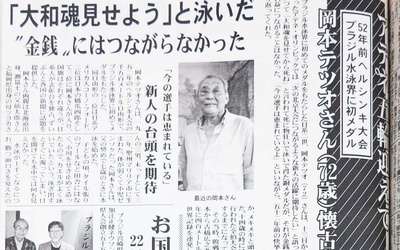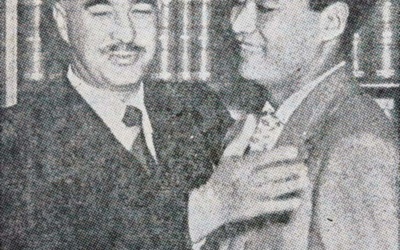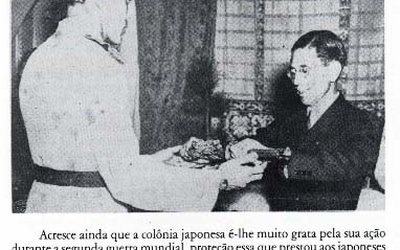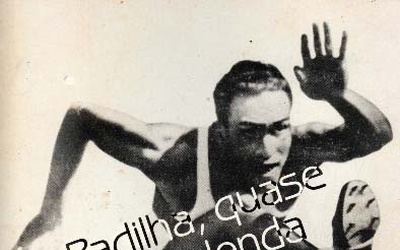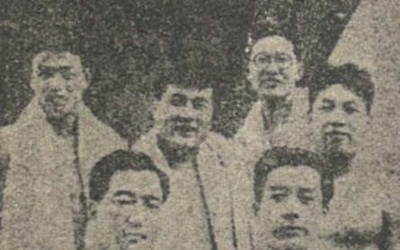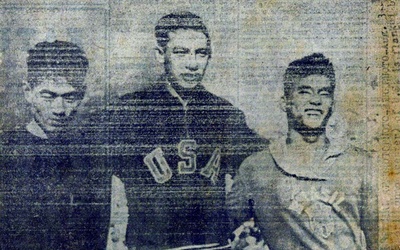Tetsuo Okamoto, a hero of Brazilian swimming: A miracle born from Japan-Brazil exchange
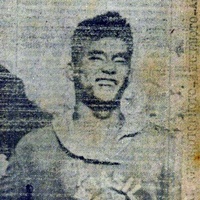
This series looks back on the history of Tetsuo Okamoto (born 1932 - died 2007), the second generation swimmer who brought the first Olympic medal to both the Brazilian swimming world and the Japanese community in Brazil. Reprinted from the Brazilian " Nikkei Shimbun " (2016)
Stories from this series
Part 6: Children of immigrants make national contributions
July 27, 2020 • Masayuki Fukasawa
Read Part 5 >> To celebrate Okamoto's great achievement, a victory celebration called the "Kappa Festival" was held in his hometown of Marilia on September 28, 1952. Three cows were roasted and a grand churrasco party was held, inviting 1,000 people. According to a report on the event in the Paulista Newspaper dated October 2, 1952, Okamoto's father, Sentaro, was in high spirits throughout the event, saying, "When I started swimming, I trained myself in my Kankai-ryu style (one of …
Part 5: How a flying fish changed Okamoto’s fate
July 20, 2020 • Masayuki Fukasawa
Read Part 4 >> In the documentary film "O nadador – A história de Tetsuo Okamoto" (hereafter abbreviated as "Swimming Athlete", 2014, 26 minutes, Portuguese, directed by Rodrigo Gullotta), which summarizes Okamoto's achievements and personality, his sister Suzue says that her brother's personality was "very modest and not very sociable. He was more devoted to sports than to studying." This personality may have been a factor in why he was not well known in the colonia. Toninho Neto, a childhood …
Part 4: Anti-Vargasist sports promotion policies
July 13, 2020 • Masayuki Fukasawa
Read Part 3 >> A surprising connection from before the war Research revealed that Padilha had indeed been working at the Sports Bureau since before the war. He was highly trusted by Adhemar Barros, who was appointed Consul General of São Paulo State (1938-41) by the Vargas dictatorship, and he began construction of the Baby Baglioni Sports Complex in the Agua Branca district of São Paulo, and the Ibirapuera Sports Complex Constantino Vaz Guimarães. The former is still used as …
Part 3: The unsung hero, Director Padilha
July 6, 2020 • Masayuki Fukasawa
Read Part 2 >> The Director of the São Paulo State Sports Bureau who gave permission to fly the Japanese flag at the Pacaembu swimming pool was Mr. Padilha, the same man who had given special permission for the Japanese to use the pool during the war. The March 28, 1950 edition of the Paulista newspaper carried a comment by Director Padilha, which read, "Never before has a foreign athlete participated in this tournament. We are extremely pleased that we …
Part 2: A ray of hope in the midst of hardship for Japanese immigrants
June 29, 2020 • Masayuki Fukasawa
Read Part 1 >> At the US-led Pan-American Conference of Foreign Ministers held in Rio in January 1942, ten South American countries, excluding Argentina, resolved to sever economic relations with the Axis powers, and on the 29th of the same month, the Brazilian government also declared the severance of diplomatic relations with the Axis powers. As part of its crackdown on "enemy nationals," the São Paulo State Security Bureau imposed restrictions on Japanese immigrants, such as "prohibiting the distribution of …
First medal in swimming at the 1st Helsinki Olympics
June 22, 2020 • Masayuki Fukasawa
Nisei swimmer Tetsuo Okamoto (born 1932 - died 2007) brought the first Olympic medal to both Brazilian swimming and the Japanese community. He reached third place on the podium on August 3, 1952, in the 1500m freestyle at the Helsinki Olympics (Finland). What's more, three swimmers of Japanese descent made up the podium at that time. At the time, Japanese newspapers focused on the good performance of the Japanese swimmers at the Olympics. However, despite the lingering aftertaste of the …

